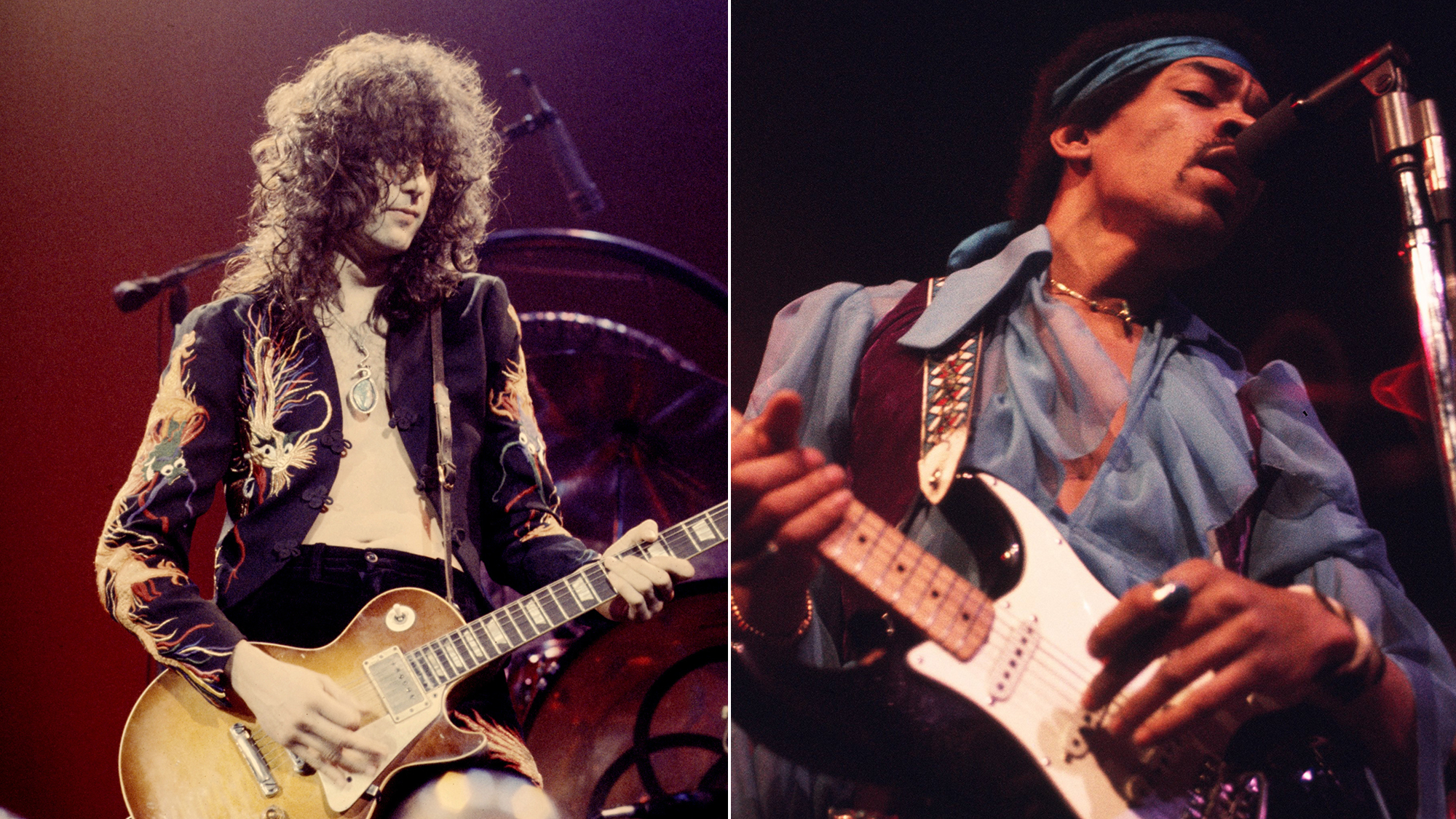Dave Brock: “I busked in cinema queues and subways. It taught me a lot and gave me plenty of practice performing”
From busking and the blues, to high times and some lows, the Hawkwind founder tells us tales of yore from his epic journey in space-rock
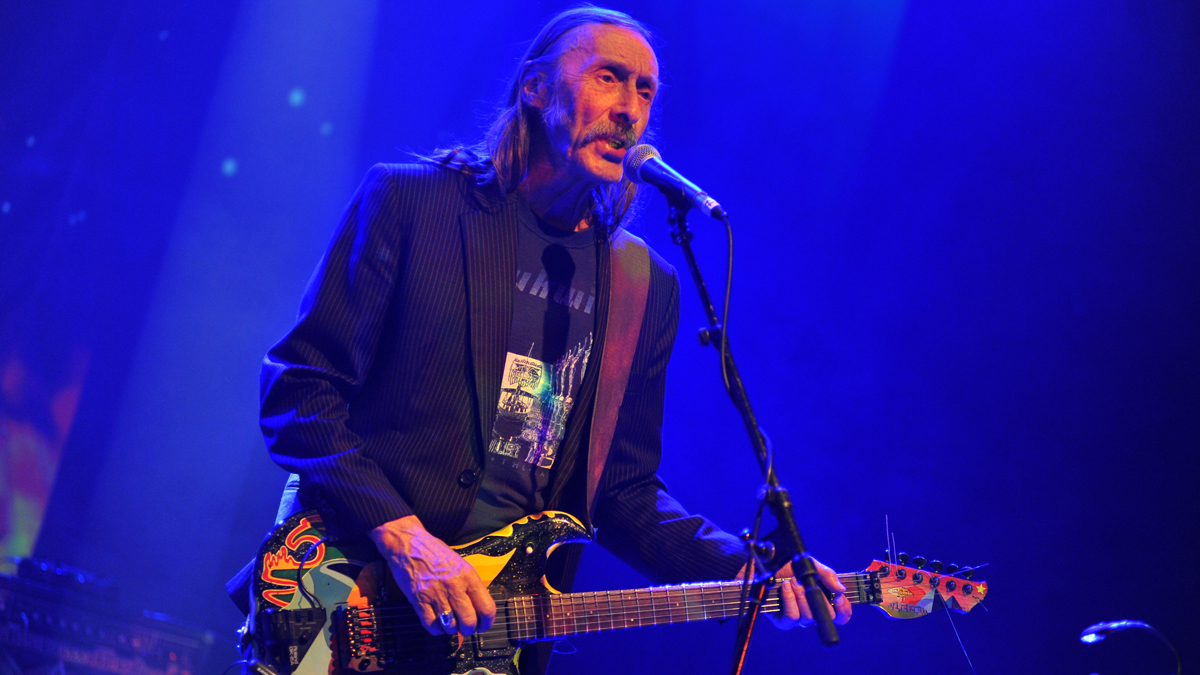
Some of you may be surprised to learn that Dave Brock – captain of the good ship Hawkwind – celebrated his 80th birthday last year. But while many octogenarians are busy putting their feet up and enjoying retirement, Dave can’t think of anything worse. “I don’t want to retire,” he states emphatically. “It’s boring.”
Indeed, 2021 saw the band put out their 34th studio album, Somnia – the follow-up to 2020’s Carnivorous and 50th Anniversary Live albums – while the Dust Of Time: 1969-2021 anthologies were released in December. Amidst it all, Guitarist caught up with the space-rock overlord to traverse time and space (and various other dimensions along the way).
My First Guitar
“I was about 13 or 14 when I got my first guitar, but I had a banjo before that, that my uncle Morris gave me. I didn’t know how to play it, though. My mum and dad bought my first guitar, an acoustic guitar, but I can’t remember what make it was. My first electric guitar was a Harmony Stratotone – a bit like Jimmy Reed’s [Kay K161 Thin Twin].
“My art teacher, Mr Dyson, heard I was listening to blues and jazz, and was really enthusiastic about telling me about different jazz musicians and what to listen to, so that helped a lot. He used to write down chords for me. Also, Bert Weedon had a book called Play In A Day, which taught me a lot early on.”
Passport To Eelpiland
“There was a bit of a scene in the late '50s and early '60s in Richmond. That’s where I met Eric [Clapton] and a load of other people who used to hang out in the L’Auberge coffee bar. We always used to hang out there before going over to Eel Pie Island.
“That was where it all happened in our era. You used to get these little membership cards labelled ‘Passport’ for the [Eelpiland] club. I loved going over there and listening to jazz. Later on, they had blues artists playing there. Eventually, me and a friend ended up playing in the interval.
“That’s how I met Memphis Slim and Champion Jack Dupree. The guy who used to run Eelpiland, Arthur Chisnall, was an innovator because he’d book all these different blues artists in. Arthur Chisnall got so many people into blues and jazz – Eric Clapton, The Yardbirds and Jeff Beck, they all went to Eelpiland.”
Get The Pick Newsletter
All the latest guitar news, interviews, lessons, reviews, deals and more, direct to your inbox!
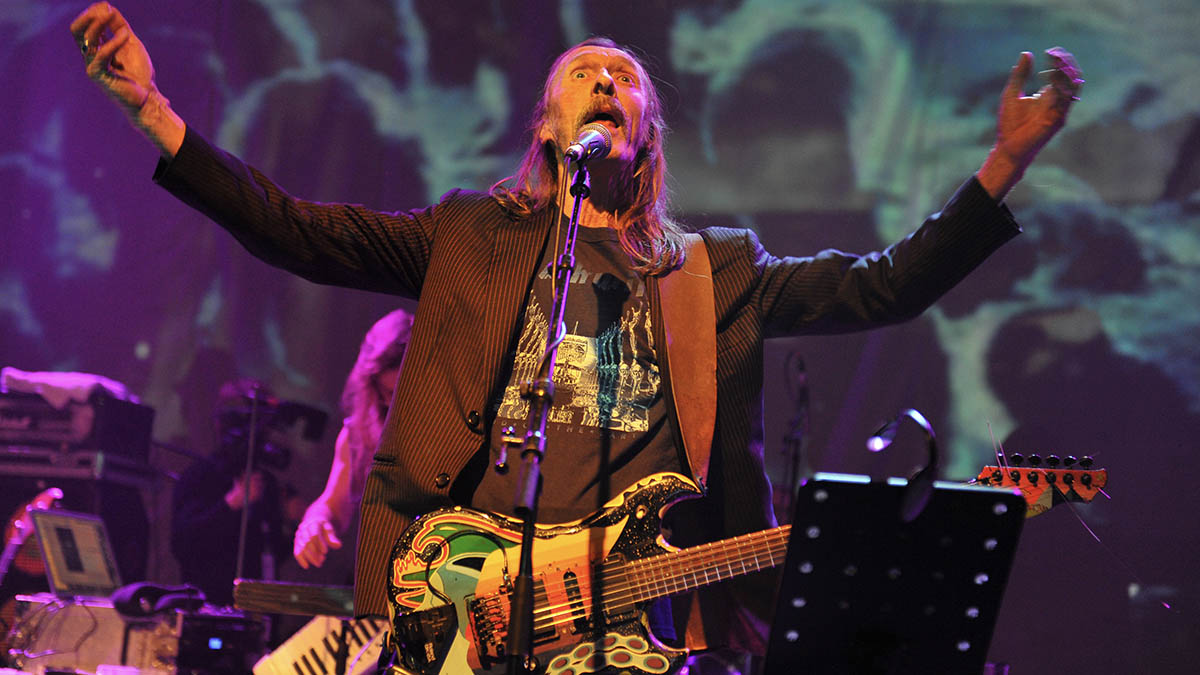
The Busking Life
“From about 1964, I had a blues band with [pianist] Mike King and [harmonica player] Luke Francis. We were called the Dharma Blues Band and we did some recording for Immediate Records.
“Around ’66, I travelled around Europe playing music for a while, and when I came back I ended up busking in cinema queues and subways in London for a few years. It was a good way of earning money and was quite well organised. I think it taught me a lot and gave me plenty of practice performing.”
Launching Hawkwind
“Don Paul – who produced The Buskers album [1969] that I recorded a couple of tracks for – helped us out and we recorded an acetate of Hurry On Sundown, Cymbaline and Mirror Of Illusion. Then we played the All Saints Hall [in Notting Hill].
When I got Hawkwind together in 1969 people were still taking loads of acid. It was a real party scene
“There was this Saturday night freak-out night down there where everybody used to take acid and jump around. We went and played down there for about 20 minutes and that’s how we got signed up. That’s how we managed to get our first record deal.
“To make our first album [Hawkwind, 1970] was a dream for all of us. It was fantastic to actually do that. We signed a deal with United Artists for five years and worked hard to get a following.”
Happy Daze
“The Middle Earth Club [in Covent Garden] was jolly fun, too. They had their Saturday all-nighters around ’67/’68. When I got Hawkwind together in 1969 people were still taking loads of acid. It was a real party scene.
“The far end of Portobello Road [in Notting Hill] was where Friends magazine had its office, and next door was a record shop with big speakers outside playing loud reggae music all the time. The joy of it was you could sit around smoking marijuana and it was a nice thing happening all in one place. It was really nice.
The police would stop the van and search everybody. It happened so often the police knew us all by our first names!
“On Saturday afternoons we used to play underneath the flyover because there was a power point down there. So, there was us and the Pink Fairies, and we used to combine into one band with two drummers and two basses. It was good fun. There are loads of photos from there on the old In Search Of Space vinyl artwork.
“Really happy times! Although back then it could also be a real pain in the arse because we used to get stopped and searched all the time. The police would stop the van and search everybody. It happened so often the police knew us all by our first names!”
Free Festivals
“Friends and International Times – the underground newspapers – used to have happenings quite often. There were always things going on, so there was always plenty of like-minded people around. The free festivals used to give lots of young bands an opportunity to play because it was a local stage.
There were lots of great bands with great musicians in them who unfortunately took too many drugs
“That’s what it was like – young bands would come along and ask to play and, yeah, of course they could. They might be awful, but it gave them a chance to do something. There were lots of great bands with great musicians in them who unfortunately took too many drugs. Which was a real shame because some of the writing was amazing. Later, we met some amazing bands like 2000DS who were brilliant, and lots of bands that are still going now like RDF and Ozric Tentacles.”
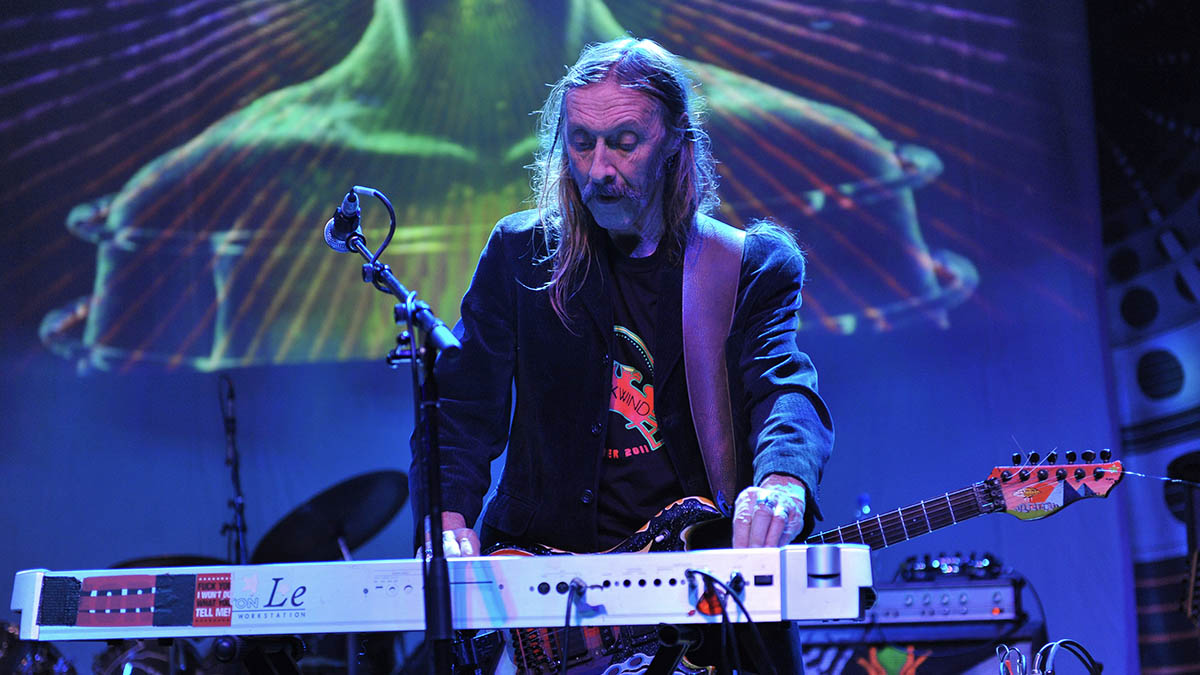
Dodgy Ground
“When we did the White Horse Free Festival in Westbury [Wiltshire, 1985] it pissed down with rain. We thought we were going to get electrocuted because the rain was coming through the tarpaulin and onto our equipment. This was around the time of the Battle of the Beanfield.
“Roy Harper was playing there and we were sitting in his tent. He had some After Eights because it was his birthday. But they got knocked over and fell on the floor. Unfortunately, someone had trod in dogshit, and he ate one that had it on by mistake. He was really ill and had to go home!
“There used to be lots of awful things happen at free festivals, like drunk people would come reeling into you on stage knocking things over and being aggressive, and you’d have to kick them up the arse.”
Fear & Loathing In Glasgow
“We played in the Apollo in Glasgow – it used to be called Green’s Playhouse – and there’s a big drop from the stage. I mean, a big drop, maybe 10ft or so. The stupid thing was, I got hopelessly stoned before we went on and every time I got near the microphone to sing, I thought I was going to trip over and fall off the stage.
“I had proper vertigo. It was awful. Every time I came up to do the vocals, I couldn’t do it! Everyone was looking at me like, ‘What the fuck’s wrong with him?!’ The strange thing is, when we played there again a year later, I had the same paranoia.”
Stage Nerves
“I don’t get nervous, generally. Maybe sometimes, but it all depends on the stress factors involved. Sometimes, with gear, you’ve just got to make the most of it and get on with it.
“I used to get nervous playing in folk clubs years ago when there was only about 10 people there. There were a couple of great little folk clubs in Soho – Le Macabre and Les Cousins. They were really small and everyone could hear everything.
“Years ago, we used to sit in the dressing room and actually play numbers to warm up. We don’t really do that any more. Nowadays, I just sit down and plonk around. We probably should, though… ”
The Show Must Go On
If I was going to give any advice to my younger self I’d say, ‘Practice!’ Practice and dedication is everything
“If I was going to give any advice to my younger self I’d say, ‘Practice!’ You have to be dedicated. Practice and dedication is everything, along with perseverance. You have to keep going no matter what.
“Several years ago, I cut the tip of my finger off and about three weeks afterwards I had to play the Sweden Rock Festival on the Lemmy Stage with my middle finger bandaged up. But I couldn’t play all the chords properly because of this big white bandage. It still hurts occasionally, even now.
“But you’ve got to keep going. It was quite funny, really – I was sitting there being interviewed about Lemmy on Swedish television with my middle finger sticking straight up.”
Learning From Lemmy
“When I first started, I used to copy Big Bill Broonzy. When people first start playing, they often copy someone they really like and that gets them going. But from there on you can go off on your own trip. Lemmy had a different way of playing bass, but you’ve got to remember he was a guitarist.
“If you’re a guitarist and you play a bass, sometimes you don’t play it the same as someone who’s been brought up playing the bass. Lemmy used to play a lot of chords. Different technique. Different style. And between the pair of us we had a great understanding. Playing together and travelling around together all the time you get to know exactly what people are like.”
Equal Measures
“When I first met Kris [Hawkwind manager and Dave’s wife] she was screenprinting t-shirts. And then she went to Exeter University to study drama before working with us on stage doing miming. But she’s ended up being our manager. And she’s really good!
“She really cares what goes on and you can trust her. That’s what really matters. We’ve been together for over 40 years now. We’re living in a day and age where women can do exactly the same as what blokes can. It’s nonsense to say they can’t. We’ve got a couple of women on our live crew doing PA and monitors. We see women working more and more on the light show as well.”
Healthy Living
“You go through life and your perspectives change on things. The essence to life is to try and get at least eight hours’ sleep for the body to recuperate. I always try. I used to go all night and the next day feel all washed out, but now I’m quite cautious and always try to manage eight hours.
“It’s the same thing as eating: if you eat regularly – breakfast, lunch and dinner – you can pretty much retain some sort of sense of normality. I still eat vegan, which I think is another one of the reasons I’m pretty healthy. I live on a farm and there’s always plenty to do, so that keeps me physically active.”
Onwards & Upwards
“I still use the same rig I’ve had for years, which includes a Roland [JC-120] amp and a Line 6 POD [Version 2.0]. My main guitar is a [2007] Tom Morgan-painted Gibson Les Paul Classic. I recently bought a 1976 Greco Les Paul off eBay for about £400. It’s a really lovely little guitar and the pickups are really good.
We’ve got a load of music gear we want to raffle and give all the money to different animal charities, so look out for some of that gear on the Hawkwind website
“In fact, I’ve got two Grecos now. We’ve got a load of music gear we want to raffle and give all the money to different animal charities, so look out for some of that gear on the Hawkwind website.
“I tend to use the same gear. And I never really listen back [to recordings]; I only listen to what we’re doing now. I always like to move on to something else. I really like to finish whatever it is I’m working on and get on with something different. I always have stuff in the pipeline, but it’s having the time to get on with it. You can never stop learning guitar. There are so many different ways of playing guitar, you could never stop learning. It’s endless.”
- Dust Of Time: An Anthology is out now via Atom Henge.
Rod Brakes is a music journalist with an expertise in guitars. Having spent many years at the coalface as a guitar dealer and tech, Rod's more recent work as a writer covering artists, industry pros and gear includes contributions for leading publications and websites such as Guitarist, Total Guitar, Guitar World, Guitar Player and MusicRadar in addition to specialist music books, blogs and social media. He is also a lifelong musician.
“It was tour, tour, tour. I had this moment where I was like, ‘What do I even want out of music?’”: Yvette Young’s fretboard wizardry was a wake-up call for modern guitar playing – but with her latest pivot, she’s making music to help emo kids go to sleep
“One of the guys said, ‘Joni, there’s this weird bass player in Florida, you’d probably like him’”: How Joni Mitchell formed an unlikely partnership with Jaco Pastorius


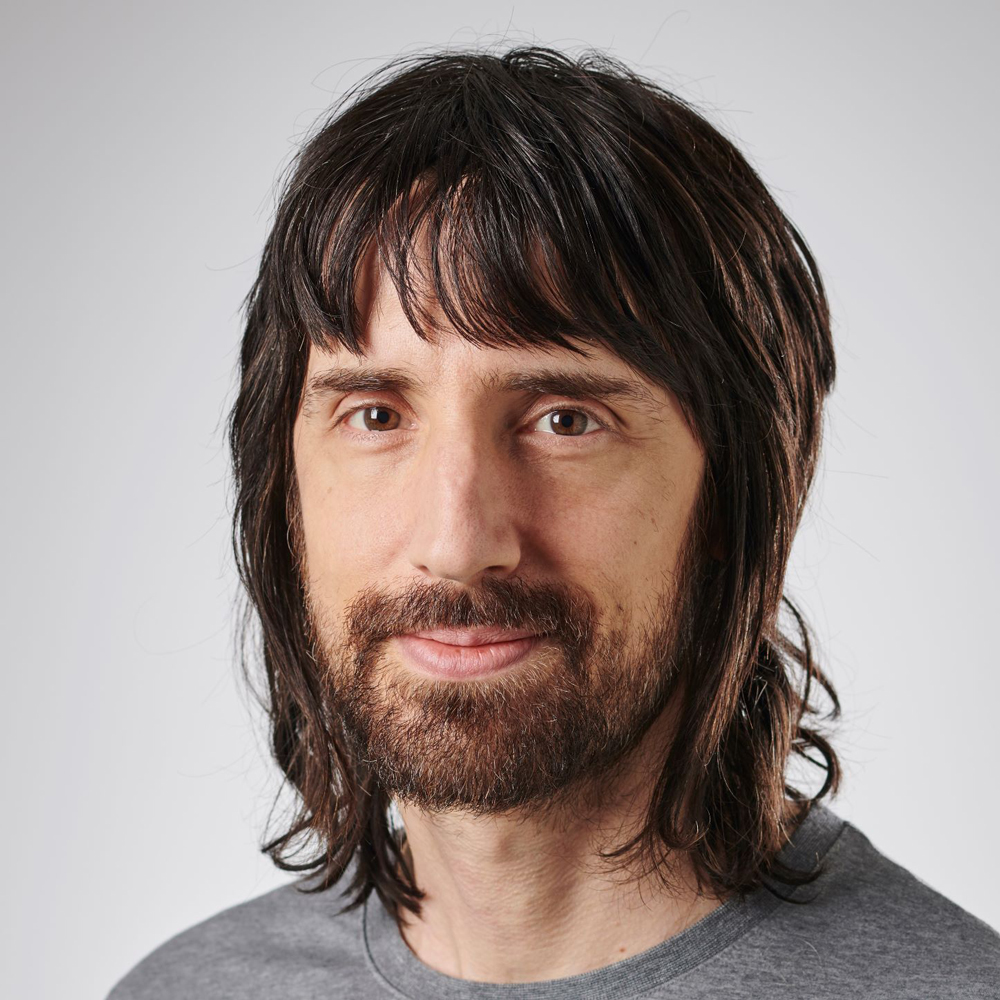







![John Mayer and Bob Weir [left] of Dead & Company photographed against a grey background. Mayer wears a blue overshirt and has his signature Silver Sky on his shoulder. Weir wears grey and a bolo tie.](https://cdn.mos.cms.futurecdn.net/C6niSAybzVCHoYcpJ8ZZgE.jpg)

![A black-and-white action shot of Sergeant Thunderhoof perform live: [from left] Mark Sayer, Dan Flitcroft, Jim Camp and Josh Gallop](https://cdn.mos.cms.futurecdn.net/am3UhJbsxAE239XRRZ8zC8.jpg)
